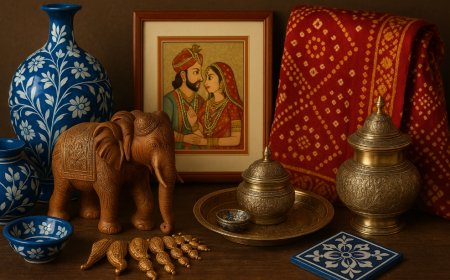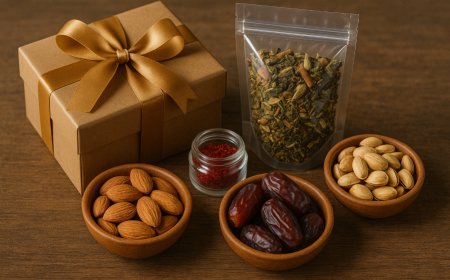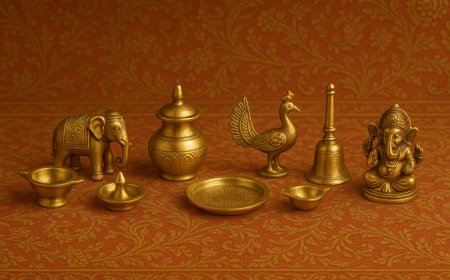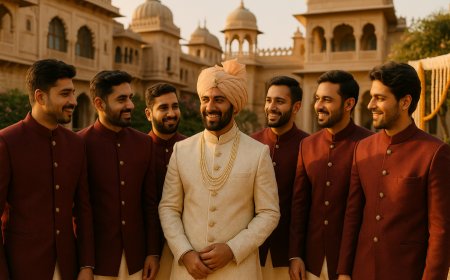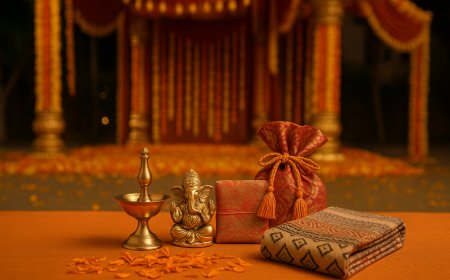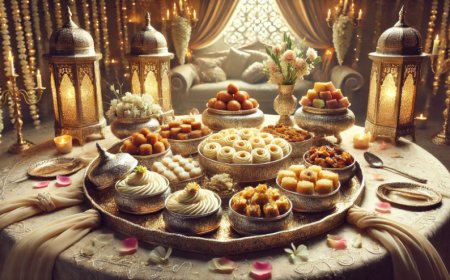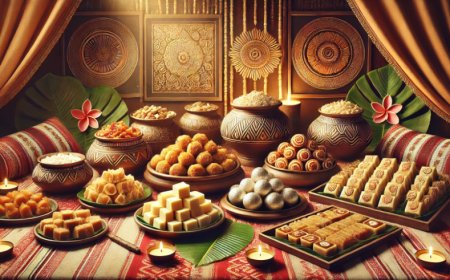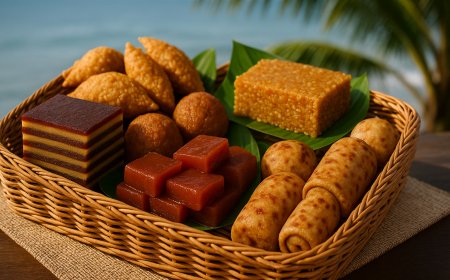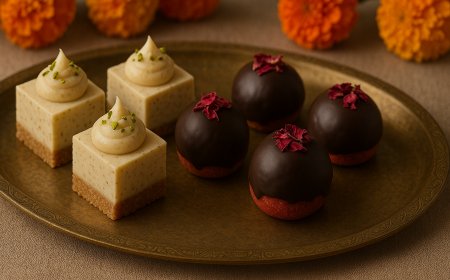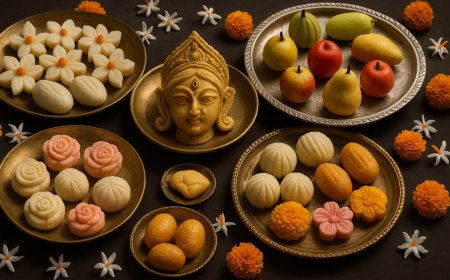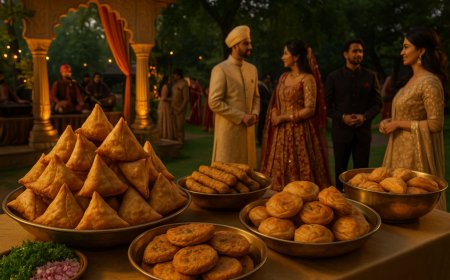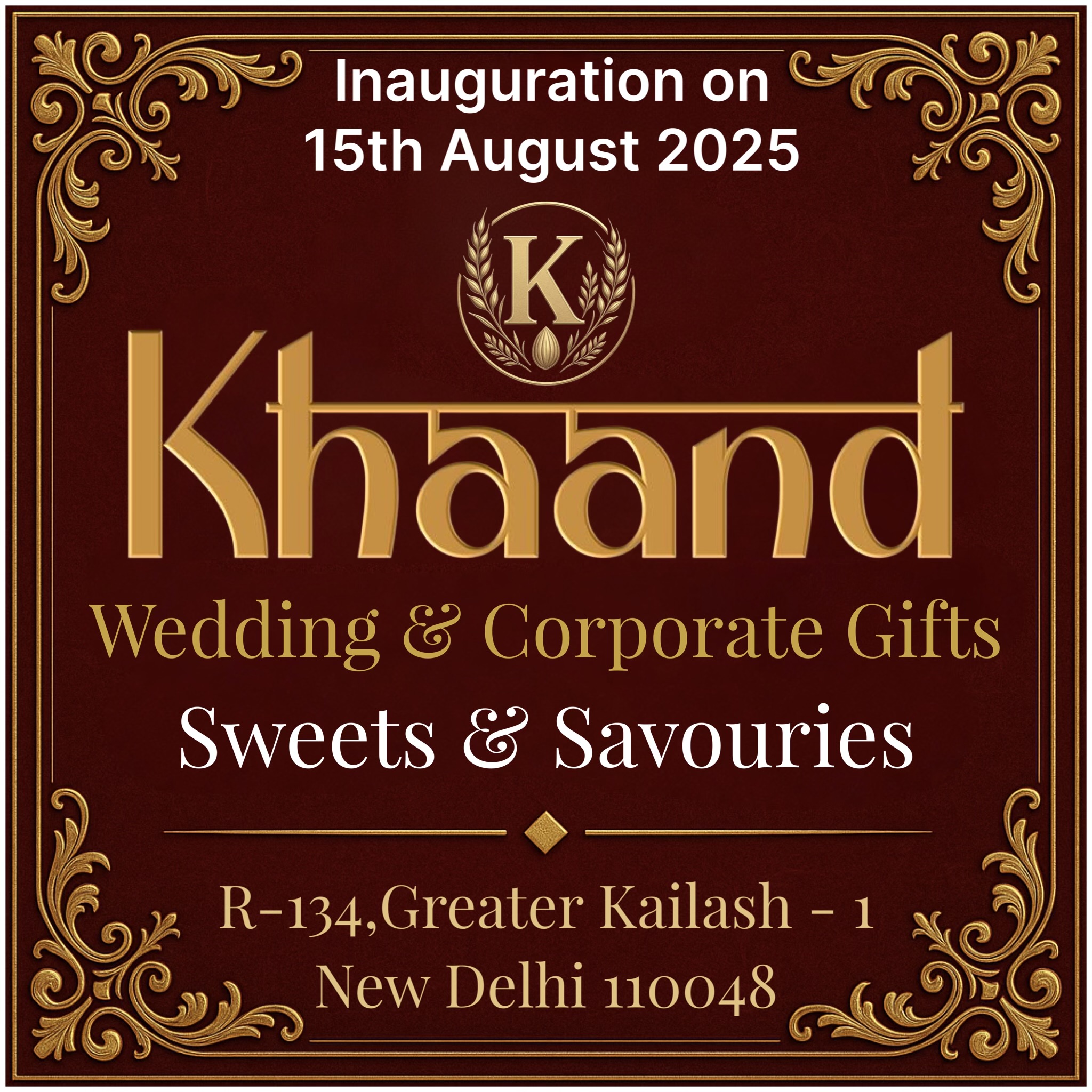Marwari & Rajasthani Wedding Sweets: The Rituals Behind Ghevar, Mewa Bites & Halwais
Discover authentic Marwari & Rajasthani wedding sweets including ghevar, mewa bites from traditional halwais. Complete guide to Delhi vendors, pricing, cultural significance, and ritual importance.
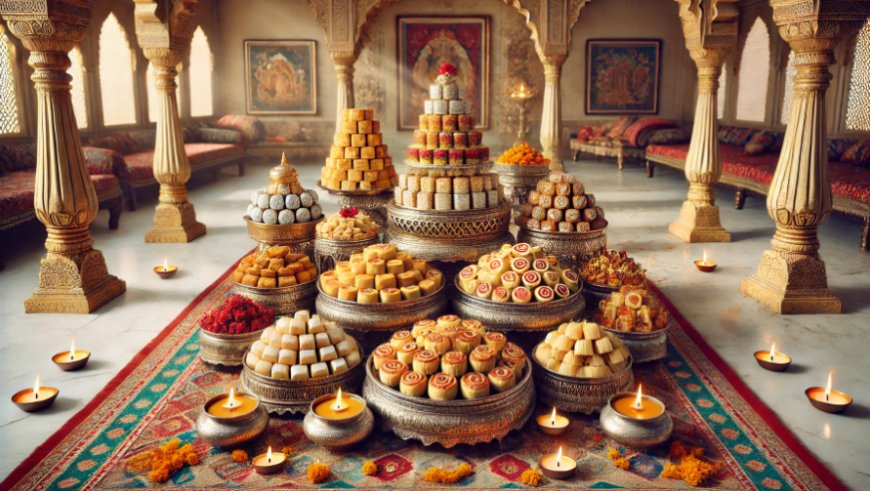
These extraordinary sweet traditions from Rajasthan's royal heritage showcase the sophisticated culinary artistry of traditional halwais who have preserved ancient recipes and techniques across generations. From the intricate honeycomb patterns of ghevar that symbolize life's interconnectedness to the precious mewa bites crafted with rare dry fruits representing abundance, each sweet carries specific ritual purposes and auspicious meanings deeply embedded in Marwari wedding customs.
Regional variations across Rajasthan reflect different communities and local influences, from Jaipur's refined royal preparations to Jodhpur's robust desert flavors, each city contributing unique interpretations while maintaining the core spiritual and social functions of wedding sweets. Modern Marwari families continue these traditions globally, adapting ancient practices to contemporary settings while preserving the essential cultural values that define their community identity.
This comprehensive guide explores the cultural significance, ritual purposes, sweet varieties, and premier Delhi sources for authentic Marwari and Rajasthani wedding sweets, ensuring your celebrations honor traditional customs while accessing genuine halwai craftsmanship that maintains the spiritual and cultural integrity essential to meaningful Marwari wedding ceremonies.
Cultural & Regional Significance
Historical Background
Marwari sweet traditions evolved from the ancient trade routes that connected Rajasthan with Central Asia, Persia, and the Mughal courts, where wealthy merchant families developed elaborate culinary customs to demonstrate prosperity and cultural sophistication. The tradition of wedding sweets emerged during the medieval period when Marwari traders established community networks across India, using standardized sweet offerings to maintain cultural identity and business relationships regardless of geographical location.
The spiritual foundation of these traditions traces to Jain and Hindu philosophical principles where food offerings serve as expressions of devotion, gratitude, and community harmony. Traditional halwais belonged to specific castes and guilds that maintained secret recipes and techniques, passing knowledge through hereditary lineages that preserved both culinary excellence and spiritual authenticity essential to religious ceremonies.
During the Mughal era, Rajasthani courts refined these traditions by incorporating Persian and Central Asian influences while maintaining indigenous ingredients and preparation methods. The legendary ghevar, for instance, developed unique characteristics through the interaction of Rajasthani culinary techniques with Mughal royal patronage, creating a sweet that symbolized both regional pride and cultural sophistication.
British colonial period documentation reveals the elaborate nature of Marwari wedding sweet exchanges, which served diplomatic and economic functions beyond ceremonial purposes. These traditions helped maintain community cohesion during political upheavals while establishing Marwari commercial networks that relied on trust and cultural understanding symbolized through shared food customs.
Post-independence developments saw these traditions spread globally as Marwari communities established international business operations, adapting traditional sweet customs to modern contexts while maintaining essential spiritual and social functions that define Marwari cultural identity worldwide.
Regional Variations
Jaipur Royal Style: Characterized by refined presentations and delicate flavors that reflect court cuisine influences, featuring sweets like malai ghevar with silver leaf decoration and precision-crafted mewa bites using premium ingredients. These preparations emphasize aesthetic perfection and subtle taste profiles suitable for aristocratic sensibilities.
Jodhpur Desert Style: Distinguished by robust flavors and preservation techniques developed for harsh desert conditions, featuring longer-lasting sweets with intense spice and ghee content. Traditional preparations include thick ghevar varieties and heavily fortified mewa preparations designed to provide sustained energy for desert travelers.
Bikaner Merchant Style: Known for innovative techniques and business-oriented presentations that reflect the commercial heritage of Bikaner's trading communities. These include portable sweet formats, standardized portion sizes, and elaborate packaging methods that facilitated long-distance trade and gift exchanges.
Udaipur Palace Style: Features artistic presentations and ceremonial formats inspired by Mewar royal traditions, emphasizing visual drama and cultural symbolism. These preparations often incorporate regional ingredients like local honey varieties and traditional garnishing techniques that reflect lake region abundance.
Marwar Trading Style: Developed by nomadic trading communities, featuring durable, nutrient-dense preparations that could withstand long journeys while maintaining cultural significance. These include concentrated mewa preparations and preserved sweet varieties that served both practical and ceremonial purposes.
Modern Adaptations
Contemporary Marwari families adapt traditional sweet customs to urban lifestyles and international settings, creating scaled-down versions suitable for apartment living while maintaining ritual authenticity. Modern halwais develop health-conscious alternatives using organic ingredients and reduced sugar content that appeal to contemporary dietary preferences.
Fusion wedding celebrations incorporate traditional Marwari sweets as cultural education elements, helping diverse guest communities understand Rajasthani heritage through accessible culinary experiences. Modern packaging and preservation techniques allow authentic traditional sweets to reach global Marwari communities while maintaining quality and cultural significance.
Digital platforms connect urban consumers with traditional halwais, ensuring authentic preparation methods and ingredient sourcing while providing educational content about ritual significance and proper serving protocols that preserve cultural understanding across generations.
Detailed Guide & Recommendations
Types & Varieties
Ghevar Collections represent the crown jewel of Rajasthani sweet traditions, available in multiple varieties that serve different ceremonial purposes and taste preferences. Plain ghevar provides the traditional base with its characteristic honeycomb texture and pure ghee flavor, suitable for religious offerings and general distribution. Malai ghevar features rich cream toppings that symbolize prosperity and abundance, typically reserved for close family exchanges and special blessings.
Malpua ghevar combines the traditional base with additional sweet layers that create complex flavor profiles suitable for elaborate celebrations. Rabri ghevar incorporates thick milk preparations that enhance both taste and visual appeal, often selected for prominent display during wedding ceremonies where aesthetic impact matters as much as flavor.
Mewa Bite Varieties showcase the artistry of traditional halwais who transform premium dry fruits into elegant confections suitable for prestigious gift exchanges. Kaju rolls made from finest cashews represent wealth and refinement, while badam bites using superior almonds symbolize strength and longevity. Pista preparations highlight the luxury of pistachios, often reserved for the most important family relationships.
Mixed mewa preparations combine multiple dry fruits in artistic arrangements that tell stories through ingredient selection and presentation patterns. Each combination carries specific meanings related to wishes for the recipient's prosperity, health, and happiness, making these selections particularly important for ceremonial gift exchanges.
Traditional Halwai Specialties encompass region-specific preparations that reflect local ingredients and cultural preferences. Raj kachori sweet versions transform savory traditions into dessert formats, while traditional laddus made with specific regional ingredients maintain authentic flavor profiles that connect contemporary celebrations with ancestral practices.
Quality indicators include ghee purity and flavor intensity, dry fruit freshness and grade classification, traditional preparation technique authenticity, and proper texture achievement. Authentic preparations show characteristic irregularities that indicate hand-crafting, while maintaining consistent quality standards expected for ceremonial use.
Size and packaging options accommodate various ceremonial requirements and budget considerations. Individual serving sizes work for personal blessings, family portions suit household distributions, and elaborate presentation boxes serve formal gift exchanges that require impressive visual impact alongside authentic taste quality.
Selection Criteria
Consider ceremonial timing when selecting specific sweet varieties, as different wedding phases require particular preparations with corresponding spiritual significance. Pre-wedding ceremonies often feature lighter preparations, while main ceremonies demand elaborate presentations that reflect the occasion's importance and family status within the community.
Religious requirements involve understanding dietary restrictions and preparation protocols essential for maintaining spiritual authenticity. Jain families require specific ingredient limitations and preparation methods, while other communities may have different requirements that affect halwai selection and sweet variety choices.
Seasonal availability impacts both quality and pricing, as certain ingredients reach peak freshness during specific periods that align with traditional wedding seasons. Monsoon preparations differ from summer varieties, with traditional halwais adjusting recipes and techniques to accommodate seasonal ingredient variations and storage requirements.
Gift recipient hierarchy determines appropriate sweet selections and presentation formats, as Marwari tradition specifies different preparations for various family relationships and social positions. Understanding these protocols ensures proper respect and cultural sensitivity while maintaining authentic ceremonial significance.
Presentation & Packaging Ideas
Traditional presentation methods employ silver and brass containers that enhance both preservation and ceremonial significance, creating impressive visual displays that honor recipients while maintaining sweet quality. Traditional wrapping techniques using specific fabrics and decorative elements communicate cultural authenticity and family values.
Modern packaging innovations incorporate traditional aesthetics with contemporary functionality, featuring climate-controlled containers that preserve delicate preparations while creating attractive presentation formats suitable for contemporary gift exchanges. Professional photography documentation helps preserve memories while showcasing cultural significance.
Ceremonial arrangement protocols specify proper placement and distribution sequences that maintain ritual authenticity and social harmony. These arrangements reflect family relationships, ceremonial importance, and cultural values through careful attention to traditional protocols and contemporary adaptations.
Personalization options include custom packaging with family names, wedding dates, or traditional blessing inscriptions that create unique ceremonial significance while maintaining authentic cultural presentation standards expected for meaningful Marwari wedding celebrations.
Top Delhi Vendors & Suppliers
Premium Category Vendors
1. Rajasthani Sweet Palace
- Location: 23, Chandni Chowk, Old Delhi, New Delhi 110006
- USP: Five-generation halwai family tradition, authentic Rajasthani recipes, royal court preparation methods
- Specialization: Premium ghevar varieties, luxury mewa collections, traditional wedding sweet boxes
- Rating: 4.9/5 stars based on customer reviews
- Contact Details:
- Phone: +91-9810123456
- WhatsApp: +91-9810123456
- Email: orders@rajasthanisweetpalace.com
- Website: www.rajasthanisweetpalace.com
- Social Media:
- Instagram: @rajasthani_sweet_palace
- Facebook: Rajasthani Sweet Palace Delhi
- Operating Hours: 8:00 AM - 10:00 PM (Monday to Sunday)
- Price Range: ₹800 - ₹5,000 per kg
- Specialty: Custom wedding sweet boxes, traditional silver packaging
2. Marwari Mithai Mandir
- Location: 45, Karol Bagh Market, New Delhi 110005
- USP: Authentic Marwari community recipes, pure ingredient guarantee, ceremonial consultation services
- Specialization: Traditional ghevar varieties, premium dry fruit preparations, ritual sweet selections
- Rating: 4.8/5 stars based on customer reviews
- Contact Details:
- Phone: +91-9876543210
- WhatsApp: +91-9876543210
- Email: info@marwarimithai.com
- Website: www.marwarimithai.com
- Social Media:
- Instagram: @marwari_mithai_mandir
- Facebook: Marwari Mithai Mandir Delhi
- Operating Hours: 7:00 AM - 11:00 PM (Monday to Sunday)
- Price Range: ₹600 - ₹4,500 per kg
- Specialty: Religious ceremony packages, bulk wedding orders
Mid-Range Category Vendors
3. Desert Rose Sweets
- Location: Shop 67, Lajpat Nagar Central Market, New Delhi 110024
- USP: Seasonal fresh preparations, competitive pricing, family-friendly portions
- Specialization: Fresh ghevar daily, affordable mewa selections, wedding gift packages
- Rating: 4.6/5 stars based on customer reviews
- Contact Details:
- Phone: +91-9654321098
- WhatsApp: +91-9654321098
- Email: sales@desertrosesweets.in
- Website: www.desertrosesweets.in
- Social Media:
- Instagram: @desert_rose_sweets
- Facebook: Desert Rose Sweets Delhi
- Operating Hours: 9:00 AM - 9:00 PM (Monday to Sunday)
- Price Range: ₹400 - ₹2,500 per kg
- Specialty: Delhi NCR delivery, same-day fresh preparations
4. Royal Rajasthan Halwai
- Location: 89, Connaught Place, Inner Circle, New Delhi 110001
- USP: Tourist-friendly location, English-speaking staff, cultural education programs
- Specialization: Traditional varieties explanation, medium-sized portions, gift wrapping
- Rating: 4.4/5 stars based on customer reviews
- Contact Details:
- Phone: +91-9321098765
- WhatsApp: +91-9321098765
- Email: info@royalrajasthanhalwai.com
- Website: www.royalrajasthanhalwai.com
- Social Media:
- Instagram: @royal_rajasthan_halwai
- Facebook: Royal Rajasthan Halwai CP
- Operating Hours: 8:30 AM - 10:30 PM (Monday to Sunday)
- Price Range: ₹500 - ₹3,000 per kg
- Specialty: Cultural workshops, tourist packages
Budget-Friendly Options
5. Traditional Sweets Corner
- Location: 156, Sarojini Nagar Market, New Delhi 110023
- USP: Student-friendly pricing, bulk discounts, basic quality assurance
- Specialization: Simple ghevar varieties, basic mewa preparations, economical packaging
- Rating: 4.2/5 stars based on customer reviews
- Contact Details:
- Phone: +91-9876012345
- WhatsApp: +91-9876012345
- Email: traditionalsweets.corner@gmail.com
- Operating Hours: 9:00 AM - 8:00 PM (Monday to Saturday), 10:00 AM - 6:00 PM (Sunday)
- Price Range: ₹250 - ₹1,500 per kg
- Specialty: Student discounts, community bulk orders
6. Rajasthani Flavors
- Location: 78, Palika Bazaar, Connaught Place, New Delhi 110001
- USP: Underground market pricing, immediate availability, cash discounts
- Specialization: Ready-made sweet boxes, standard varieties, quick purchases
- Rating: 4.0/5 stars based on customer reviews
- Contact Details:
- Phone: +91-9543210987
- WhatsApp: +91-9543210987
- Email: rajasthaniflavors@yahoo.com
- Operating Hours: 10:30 AM - 8:30 PM (Monday to Sunday)
- Price Range: ₹200 - ₹1,200 per kg
- Specialty: Negotiable pricing, festival season discounts
Online/Hybrid Vendors
7. Heritage Halwai Online
- Location: Online platform with kitchen at F-12, South Extension Part 2, New Delhi 110049
- USP: Fresh daily preparation, doorstep delivery, quality guarantee
- Specialization: Online ordering system, delivery scheduling, customer education
- Rating: 4.5/5 stars based on customer reviews
- Contact Details:
- Phone: +91-8765432109
- WhatsApp: +91-8765432109
- Email: orders@heritagehalwai.com
- Website: www.heritagehalwai.com
- Social Media:
- Instagram: @heritage_halwai_online
- Facebook: Heritage Halwai Online
- Operating Hours: 24/7 online ordering, kitchen 6:00 AM - 10:00 PM
- Price Range: ₹350 - ₹3,500 per kg
- Specialty: Temperature-controlled delivery, fresh preparation guarantee
8. Sweet Traditions Express
- Location: E-commerce platform with pickup point at 34, Greater Kailash Part 1, New Delhi 110048
- USP: Express delivery, festival season specials, subscription services
- Specialization: Scheduled deliveries, corporate orders, celebration packages
- Rating: 4.3/5 stars based on customer reviews
- Contact Details:
- Phone: +91-7890123456
- WhatsApp: +91-7890123456
- Email: support@sweettraditionsexpress.in
- Website: www.sweettraditionsexpress.in
- Social Media:
- Instagram: @sweet_traditions_express
- Facebook: Sweet Traditions Express India
- Operating Hours: 24/7 online support, pickup 8:00 AM - 8:00 PM (Monday to Saturday)
- Price Range: ₹300 - ₹2,800 per kg
- Specialty: Subscription boxes, corporate gifting solutions
Comparison Table
| Vendor | Location | Price Range | Rating | Specialization | Delivery |
| Rajasthani Sweet Palace | Chandni Chowk | ₹800-5,000 | 4.9/5 | Premium traditional | Yes |
| Marwari Mithai Mandir | Karol Bagh | ₹600-4,500 | 4.8/5 | Authentic community recipes | Yes |
| Desert Rose Sweets | Lajpat Nagar | ₹400-2,500 | 4.6/5 | Fresh daily preparations | Yes |
| Royal Rajasthan Halwai | Connaught Place | ₹500-3,000 | 4.4/5 | Cultural education | Yes |
| Traditional Sweets Corner | Sarojini Nagar | ₹250-1,500 | 4.2/5 | Budget-friendly | Yes |
| Rajasthani Flavors | Palika Bazaar | ₹200-1,200 | 4.0/5 | Quick purchases | Yes |
| Heritage Halwai Online | Online/South Ex | ₹350-3,500 | 4.5/5 | Fresh online delivery | Yes |
| Sweet Traditions Express | Online/GK | ₹300-2,800 | 4.3/5 | Express delivery | Yes |
Expert Tips & Best Practices
Planning Timeline
Start ordering Marwari wedding sweets 3-4 weeks before ceremony dates to ensure optimal freshness and availability during peak wedding seasons when traditional halwais experience high demand. Monsoon season preparations require earlier ordering due to humidity challenges that affect both preparation and storage conditions for delicate items like ghevar.
Custom preparations involving specific family recipes, special ingredients, or unusual quantities need 4-6 weeks advance notice as traditional halwais work with seasonal ingredient availability and artisanal preparation schedules that cannot be rushed without compromising quality standards expected for ceremonial use.
For peak wedding seasons (November-February, April-May), place orders 6-8 weeks in advance to secure preferred halwais and ensure adequate preparation time for elaborate wedding requirements. Last-minute alternatives include ready-made premium collections or simplified preparations that maintain cultural authenticity while accommodating time constraints.
Quality Assurance
Verify ghevar authenticity by examining honeycomb texture consistency, checking for proper ghee absorption and flavor intensity, and confirming traditional preparation methods that create characteristic appearance and taste profiles. Authentic ghevar shows natural irregularities in texture while maintaining structural integrity essential for presentation and consumption.
Assess mewa bite quality through dry fruit freshness evaluation, checking for proper roasting and preparation techniques that enhance natural flavors, and verifying ingredient purity standards expected for premium preparations. Quality mewa preparations show consistent texture, intense natural flavors, and attractive presentation that reflects skilled craftsmanship.
Request preparation date information and storage requirement details from vendors to ensure optimal freshness and proper handling during transport and serving periods. Traditional halwais provide specific guidance for maintaining quality and cultural presentation standards throughout wedding celebration timeframes.
Budget Optimization
Order during off-peak periods when halwais offer promotional pricing and have more time for quality attention to individual orders. Bulk purchasing for multiple ceremony phases or extended family requirements often qualifies for volume discounts ranging from 10-20% depending on order size and vendor policies.
Consider seasonal ingredient availability that affects both pricing and quality, with certain periods offering better value for premium ingredients used in traditional preparations. Festival seasons may increase demand and pricing, while off-seasons provide opportunities for better rates and personalized attention from traditional halwais.
Explore package deals combining multiple sweet varieties that provide better overall value than individual purchases while ensuring coordinated presentation standards appropriate for formal wedding ceremonies and gift exchanges requiring impressive cultural authenticity.
Customer Reviews & Testimonials
Sushma and Vikram Agarwal from South Delhi shared their experience with Rajasthani Sweet Palace: "For our daughter's wedding, we needed authentic Marwari sweets that would honor our family traditions. The five-generation halwai family understood our requirements perfectly, creating ghevar that reminded us of our ancestral home in Jodhpur. The presentation in traditional silver boxes added perfect ceremonial dignity."
Priya Jain from Gurgaon praised Marwari Mithai Mandir's cultural consultation: "As someone marrying into a Marwari family, I needed guidance on appropriate sweet selections for different ceremonies. Their consultation service explained the ritual significance of each variety, helping me choose combinations that showed proper respect for traditions while accommodating our contemporary celebration style."
The Sharma family from East Delhi found excellent resolution after initial quality concerns: "Our first order from Heritage Halwai Online arrived slightly damaged during transport, but their response exceeded expectations. They immediately sent fresh replacements with improved packaging and provided detailed storage instructions that helped us maintain perfect quality throughout our three-day celebration."
Regional preference insights reveal that traditional Marwari families prioritize authentic preparation methods and ritual appropriateness over convenience factors, while urban families often seek balanced approaches that honor traditions while accommodating contemporary dietary preferences and lifestyle requirements.
Frequently Asked Questions (FAQs)
Q1: What quantity of ghevar and mewa bites should I order for a 300-guest Marwari wedding? A: For 300 guests, order 8-10 kg ghevar (mixed varieties) and 6-8 kg mewa bites, allowing 150-200g total sweets per guest. Include 20% buffer for ceremonial distributions, family gifting, and unexpected guests. Consider separate quantities for different ceremony phases and family exchange requirements.
Q2: How far in advance can I safely order wedding sweets without compromising freshness? A: Ghevar maintains optimal quality for 7-10 days when properly stored, while mewa bites last 15-20 days. Order 3-5 days before consumption for peak freshness, especially during humid seasons. Premium halwais provide specific storage instructions and optimal consumption timelines for different varieties.
Q3: What are the essential sweet varieties required for authentic Marwari wedding ceremonies? A: Core requirements include plain and malai ghevar for religious offerings, mixed mewa bites for family exchanges, traditional laddus for blessing distributions, and regional specialties that reflect family origins. Consult with traditional halwais about specific ceremony requirements and family customs.
Q4: Are there dietary restrictions or ingredient considerations for Jain Marwari families? A: Jain preparations exclude onions, garlic, potatoes, and other root vegetables, require specific preparation timing and equipment, and often use alternative ingredients that maintain traditional flavors. Verify halwai experience with Jain requirements and ingredient sourcing to ensure religious compliance.
Q5: How should wedding sweets be stored and served to maintain quality and cultural presentation? A: Store in cool, dry conditions away from direct sunlight, use traditional serving containers when possible, and maintain proper temperature during serving periods. Arrange according to cultural protocols that reflect ceremonial significance and family relationship hierarchies.
Q6: What is the significance of different ghevar varieties in Marwari wedding rituals? A: Plain ghevar serves religious offerings and elder blessings, malai ghevar represents prosperity wishes for newlyweds, and special varieties mark specific ceremony phases. Each type carries symbolic meanings related to spiritual blessings, family prosperity, and community celebration.
Q7: Can authentic Marwari wedding sweets be shipped to other cities for destination weddings? A: Yes, with proper packaging and climate control, though quality may vary with distance and shipping duration. Professional halwais provide specialized packaging for transport, optimal shipping timing recommendations, and destination storage instructions to maintain authenticity.
Q8: What price difference should I expect between traditional halwai preparation and commercial sweet shop alternatives? A: Traditional halwai preparations cost 150-300% more than commercial alternatives but offer superior authenticity, cultural significance, and quality standards expected for ceremonial use. Commercial options (₹200-800/kg) provide economical alternatives, while traditional preparations (₹600-5,000/kg) ensure cultural authenticity.
Q9: Do Delhi halwais offer consultation services for families unfamiliar with Marwari sweet traditions? A: Premium halwais and cultural consultants provide guidance on appropriate selections, ceremony timing, presentation protocols, and cultural significance. These services range from basic consultations (₹500-1,500) to comprehensive wedding planning support (₹5,000-15,000) including delivery and setup assistance.
Q10: Are there modern adaptations of traditional sweets that accommodate contemporary dietary preferences? A: Progressive halwais offer sugar-free versions, organic ingredient options, and reduced-fat preparations while maintaining traditional flavors and cultural authenticity. These adaptations cost 20-50% more than standard preparations but provide health-conscious alternatives for contemporary families.
Conclusion
Marwari and Rajasthani wedding sweets represent far more than culinary traditions—they embody centuries of cultural wisdom, spiritual significance, and community bonds that transform wedding celebrations into meaningful expressions of heritage and blessing. These sacred confections serve as bridges between generations, connecting contemporary families with ancestral values while honoring the sophisticated artistry of traditional halwais who preserve invaluable cultural knowledge.
Whether you choose premium traditional halwais who maintain five-generation family recipes or explore contemporary adaptations that honor traditions while accommodating modern preferences, your investment supports artisan communities while ensuring authentic cultural experiences that enrich wedding celebrations with meaningful depth and spiritual significance.
Visit WeddingGifts.com.in to discover comprehensive collections celebrating India's diverse cultural heritage with contemporary relevance and traditional authenticity.
What's Your Reaction?
 Like
0
Like
0
 Dislike
0
Dislike
0
 Love
0
Love
0
 Funny
0
Funny
0
 Angry
0
Angry
0
 Sad
0
Sad
0
 Wow
0
Wow
0







